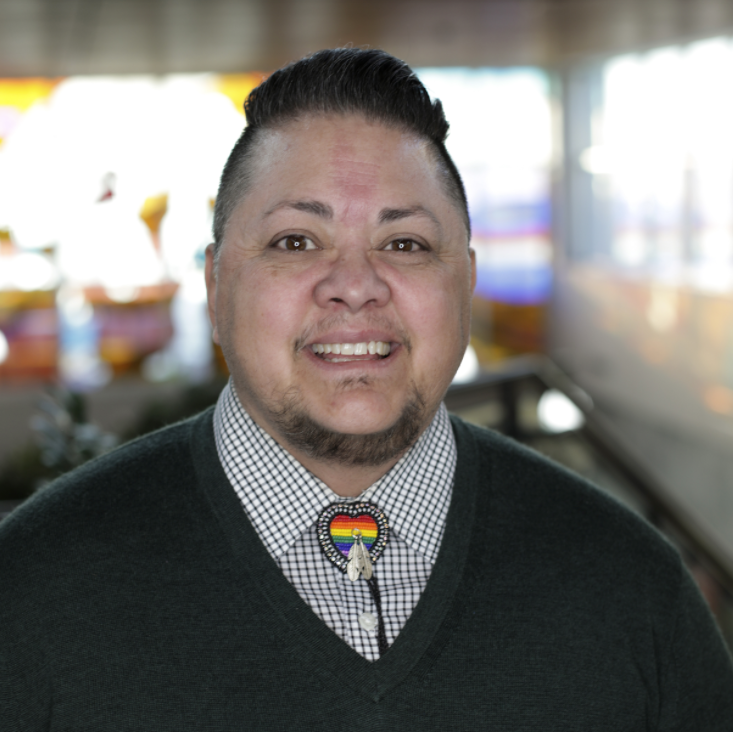“I think I started advocating the moment I was born, I just didn’t have the language,” Eli says his focus for advocacy is currently very specific to transgender, nonbinary and gender non-conforming folks because Eli says that we as a society have collapsed sexual orientation and gender identity.
“The truth is this, feelings are just feelings, clothes are just clothes. All of these things we have labeled. We are born into this world with these things already in place.” Eli says that we are forced to assimilate to these norms and that there is a cognitive dissonance when it comes to gender. The only way, he says to impact and change this is to differentiate what you are.
Eli is Menominee, Native American and he identifies as two-spirit. This is an indigenous term for those who don’t fall specifically in the gender binary. Extrinsically he identifies as masculine but he is also okay with “they” pronouns because intrinsically he is both and.
Eli says that in the medical field, there are penises and vaginas and we have assigned either male or female to that. This is where the collapse happens. “We tried to simplify something that is complex.” “We have gendered parts of our bodies.”
“I get it, there is a certain place somewhere in the world where we decided what these things are but you know what? I am a man with a vagina.”
To further the explanation of honoring someone’s identity, Eli explained “Pronouns actually aren’t a preference.” Eli says that a lot of times people in diversity/equity and inclusion work ask for their preferred pronouns, but that they should instead just ask what their pronouns are. By saying, “preferred” Eli says, “you are still kind of ‘othering’ me because you’re saying my pronouns are just a preference when they actually are not a preference.”
“It’s time for us to start to unpack these things and have conversations that are more complex. It’s beneficial to everyone that we have them.”
He said that he remembers in the early 70’s he was forced to become the invisible boy. He recalls a story of him and his brother running around the house with their shirts off. His brother ran out the front door and when Eli went to follow his mother stopped him and said, “where do you think you are going?” When Eli told her outside to play with his brother, he was told he would have to put a shirt on because he is a girl. It was in that moment that Eli said he became the invisible boy.
Back then, he was feminine presenting because he didn’t want people to know he was struggling with his gender identity. He said, if he was ultra-feminine, “you couldn’t tell there was something else going on with me.”
“I could have won an academy award for the part I played for years” It wasn’t until a few decades later that Eli would come out as transgender.
Even when he came out, there were a lot of people who told him that there are young people telling their stories and that his story wasn’t of value. Telling him he is too old to share his story. However, Eli says owning his narrative and sharing it with others has helped to elevate knowledge and awareness about people like him. Eli had never met someone who was transitioning at 50 and he believed sharing his journey could make a difference.
Today, Eli says, “I advocate for our community and that means that sometimes I need to sit in rooms and have conversations with folks who are incredibly ignorant and bigoted and share with them the knowledge and awareness they need to just do right by people like me. Sometimes that starts with the incredibly ignorant person who says you’re mentally fu**ed up and I say…no I’m not.”
“We are all interconnected, as people and with the animals, trees, grass, earth, and sky we are all one being.”
“When you pour water into a bathtub with little ships in it, they all rise at the same time. It is possible for the world to actually operate in that manner and that you and I can rise equally and have equal success. There is enough for us all.”
In an effort to create an open community, Eli and his friend Avalisa Gallo co-host a show called, “Frankly Speaking” every other Friday. The show includes frank conversations about what transgender, nonbinary and gender non-conforming people have to deal with in their day-to-day lives.
In addition to this, Eli offers a free consultation, an hour of his time to parents of transgender people, people struggling with their identity, or anyone who wishes to speak with him. He also has a blog page called, Speaking of Happy which he started in 2009 to document stories of LGBTQIA2S+ people and community allies.
Eli says, “I’m going to be doing this kind of work until the day I die.”

